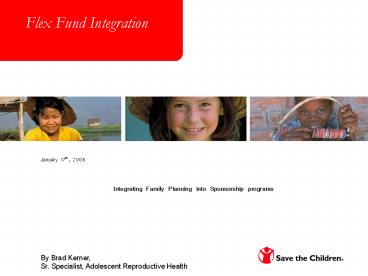By Brad Kerner, - PowerPoint PPT Presentation
1 / 18
Title: By Brad Kerner,
1
Flex Fund Integration
2
Objectives
- To review the project objectives
- Highlight the projects first year accomplishments
- Present integration model options
- Discuss successes and Challenges
3
What is Sponsorship?
4
Common Approach to Sponsorship-funded Programming
- Save the Children has developed the Common
Approach to Sponsorship-funded Programs (CASP)
which - Focuses programming in five core program areas
where SC has expertise and proven programmatic
success - Documents the approach in five program modules
and one DME module - Puts monitoring systems in place to measure and
document results achieved. - Provides program technical support to country
offices implementing programs
5
Sponsorship Core Programs
Early Childhood Development
Primary Education
School HealthNutrition
IP
HIV/AIDS
Adolescent Development
75 of Spon. program must be spent on core
programs
6
Sponsorship Supports Long-term Development in
Over 20 Countries
7
The Program Cycle
8
Why Sponsorship for FP integration?
- Natural connections to Adolescent Development
programs of which Adolescent Reproductive and
Sexual Health is a key component - Potentially easy integration into the global
Adolescent Development CASP module - Spon program review revealed that FP was not a
strong component and young married girls and
first-time mothers have not been targeted. - FP is already integrated to grant funded Child
survival and food security programs.
9
Flex Fund Integration Project Intermediate Results
- IR1 SC organizational capacity and commitment
within sponsorship to address family planning
strengthened - IR2 A model for integrating family planning into
the AD CASP module developed - IR3 FP actives in Malawi piloted to help inform
the model and recommend replicable FP strategies
within the CASP module. - (Access, Quality, Demand, Enabling
Environment)
10
Result 3Malawi Pilot Highlights from year 1
- Increasing Access
- 45 YCBDAs trained
- 20 TBAs trained to promote exclusive
breastfeeding - Referral sheets linking youth to health centers
developed
11
Intermediate Result 3Malawi Pilot Highlights
from year 1
- Improving Quality
- Supervision for YCBDAs
- FP logistics workshop
- Youth Friendly Health Services
12
Intermediate Result 3Malawi Pilot Highlights
from year 1
- Increasing Demand
- Teen mother sessions within youth clubs
- Peer drama at open days
- Reaching men though Male Motivators
- FP articles included in ARSH newsletter
13
Intermediate Result 3Malawi Pilot Highlights
from year 1
- Improved Enabling Environment
- Initiation counselors
- Community awareness and mobilization
- Engagement on national level FP dialogues and
meetings
14
Intermediate Results 2Developing a model
- Option 1 Develop a FP appendix to the AD CASP
module with tools - YCBDA training and supervision tools
- FP logistics workshop methodology
- Clinical assessment tool
- M E tools to track FP utilization
15
Results 2Developing a model
- Option 2
- Add successful and replicable FP activities
into the key activity matrix currently in the
CASP module
16
Results 2Developing a model
- Situational Analysis questions included in
updated CASP module- Feb 07 - Summer 08 Documentation of 5 key strategies and
a case study of family planning program to be
shared with all sponsorship programs.
17
Intermediate Results 1Commitment strengthened
- Sept 2006 2 staff members from Mozambique
sponsorship program came to the DME workshop in
Malawi - Feb 2007- spon annual conference Afghanistan,
Bolivia, Philippines, Mozambique, Nepal showed
interest - Sept 2007 Year 1 presentation to Head Quarter
sponsorship staff
18
Successes and Challenges
- Successes
- No resistance from HQ spon staff
- Field based activities rolling out well
- Documentation of program components planned
- Historical commitment to ARSH
- Challenges
- -Phase over- focusing on younger children
- -Strategic Planning FY08-12
- -Piloting holistic programming for youth
- (Economic Opportunities'/Education/ARSH)





























![READ[PDF] Brad Radby's Brad Radby: The Complete Filmography (1999-2023 PowerPoint PPT Presentation](https://s3.amazonaws.com/images.powershow.com/10067663.th0.jpg?_=20240628053)

